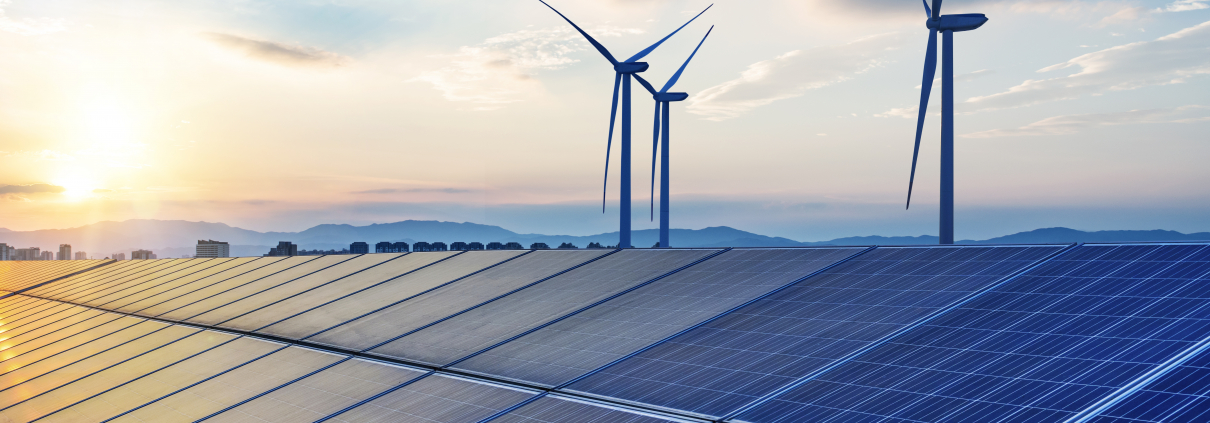Market Survey: Industrial managers call for more green power
For Germany as a business location, the rapid expansion of renewable energies is critical for the future. This is the conclusion of a survey conducted by the initiative “The Transatlantic Sun&Wind Belt” together with the opinion research institute Kantar. From October to December 2022, around 250 decision-makers from international corporations and large SMEs were surveyed.
Renewable energies set to be a key location factor of the future

“We will definitely no longer open a location with fossil energy”.
Most of the companies surveyed already consider the availability of green power to be important or very important when it comes to the question of where to make new investments. Among companies planning to invest in the next five years, the figure is even over 70 percent. In addition, 90 percent of the companies believe that the importance of access to renewable energies will continue to rise or rise sharply. The main reasons cited for this are competitive advantages and the companies’ own sustainability strategies. Climate-friendly products are increasingly demanded by customers in both the private and industrial sectors. In addition, most companies have set themselves ambitious emission reduction targets, which, especially in energy-intensive industries, can often only be met by using green electricity. At the same time, companies also point to the high cost pressure. In view of the current energy crisis, the top priority is to ensure a sufficient supply of affordable energy. However, the companies also see the faster expansion of green energy as part of the solution in the context of the energy crisis and cost pressure.

“If more green energy were to be used, the price would also fall accordingly”
“In the current debate, it is pretended that rising energy prices are standing in the way of the expansion of renewable energy. The opposite is true: green power is the cheapest on the market. In order to bring the overall electricity price back to a competitive level, a faster expansion of renewables is therefore the only logical answer,” says Milan Nitzschke, Co-Founder of the Sun & Wind Belt business initiative.
Germany is losing its appeal in international competition

“The days of being a leader are over, other countries have caught up and in some cases overtaken us”
In an international comparison, the majority of companies see Germany only in the midfield in terms of access to green infrastructure. The former pioneering role has been squandered due to a lack of political will, bureaucracy and long approval procedures, as well as a lack of incentives. As a result, other countries, especially in northern Europe, have long since overtaken Germany. But China and Japan are also cited as “leaders” due to their high investments in renewable energies. In view of the high importance that the supply of renewable energies obviously plays in investment decisions, Germany is in danger of falling behind internationally in this respect. In the future, investments in new and existing sites could be directed more to those countries and regions that offer better access to affordable green power. The U.S. is currently still rated slightly lower than Germany in terms of access to green power, but this is likely to change quickly given the dynamic development in the U.S.
“Companies have been looking at the cheaper energy prices in the U.S. for some time. So far, they still rightly rate this location as weaker in the area of CO2-free energies. But this assessment is already changing now. ”

Within Germany, the companies point to regional differences in the expansion of renewables. Companies expect the fastest development in this regard to be in the north of the country in particular. According to the companies surveyed, the top three German states that promise the best supply of renewable energy are Schleswig-Holstein (54.80%), Lower Saxony (45.60%) and Mecklenburg-Western Pomerania (30.60%). Federal states in the south of Germany appear to be clearly losing the race to become Germany-wide pioneers in the expansion of renewable energies, which could lead to significant locational disadvantages in the medium to long term. Current examples of companies that tend to look towards the federal states with a good supply of green power when relocating, such as Northvolt, Intel and Tesla, reflect this trend.
Energy-intensive industries take expansion into their own hands

Since the expansion of renewable energies in Germany as a whole is not progressing fast enough, more and more energy-intensive companies are becoming active themselves. According to their own statements, more than 40 percent of the companies surveyed are investing in the development of infrastructure for the generation of green energies themselves. More than 30 percent say that while there are currently no concrete plans to do so, they are considering building their own green infrastructure as an option for the future. These figures are a clear signal to policymakers to also pay more attention to the high demand from energy-intensive industries, which currently still account for a large share of Germany’s economic power.


